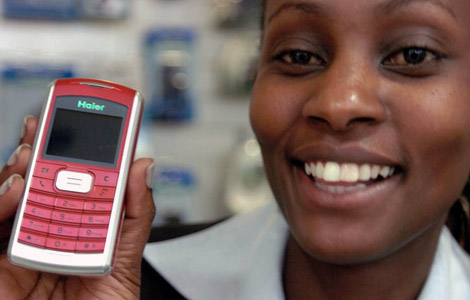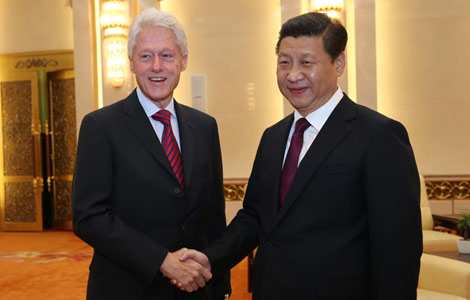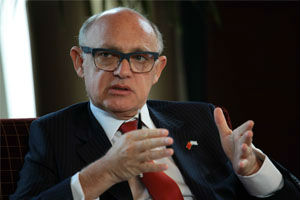China, US to boost people-to-people ties
Updated: 2013-11-19 09:17
By CHEN WEIHUA in Washington (China Daily USA)
|
||||||||
China and the United States hope that people-to-people exchanges can play a larger role in their bilateral relationship, which is often rattled by strategic distrust, trade friction and even potential military competition.
Chinese Vice-Premier Liu Yandong and US Secretary of State John Kerry are both expected to highlight the significance of that dimension at the 4th China-US High-Level Consultation on People-to-People Exchange (CPE) to be held on Thursday in Washington.
Susan Stevenson, deputy assistant secretary for public diplomacy in the Bureau of East Asian and Pacific affairs, said that although the CPE is represented by US and Chinese government officials, it is different from the dozens of other dialogues between the two countries, such as the Strategic and Economic Dialogue, human rights dialogue, and the energy policy dialogue held in Beijing late last month, which were government-to-government.
"What we're really looking at is expanding and strengthening the ways in which our two publics interact," Stevenson told a press conference in Washington on Monday.
Former Chinese President Hu Jintao and US President Barack Obama talked about setting up such a mechanism when they met in Beijing in late 2009. The CPE was launched in 2010 by Liu, then a state councilor, and then US Secretary of State Hillary Clinton. Liu and Clinton, a likely Democrat presidential candidate for 2016, will attend a seminar on early childhood development at the Brookings Institution on Wednesday.
While Stevenson, who had served in the US embassy in Beijing from 2006 to 2010, described the relationship as important, she said "what is unsung is throughout the year the many activities that we do between the Chinese and American public".
"The Consultation on People-to-People Exchange is really a long-term investment in the bilateral relationship because we realize that these exchanges, particularly among youth at much younger ages, help to create those bonds of understanding and those bonds of cooperation," she said.
"As this generation grows older, there are certainly much broader connections between our two countries than there were when I was growing up," Stevenson said.
Describing the many successes in the five pillars of the CPE — education, science and technology, culture, sports and women's issues — Stevenson said the CPE this year brings together American and Chinese counterparts to identify new opportunities and perhaps new barriers to enhancing bilateral engagement.
"We still are confident that there's room for growth," she said.
"We want to foster even greater exchange between our two peoples and develop solutions to global challenges," she said, citing the expansion of the Fulbright program to create opportunities for more Chinese scholars.
The two sides are expected to produce a fact sheet on Thursday to identify key programs for cooperation in the five areas in the coming years.
Liu and Kerry will both address a conference of the 100K Strong Foundation on Thursday to promote Obama's 2009 initiative of sending 100,000 American students to China over a period of four years.
The 2013 Open Doors report released by the Institute of International Education (IIE) showed that China was the 5th destination for US students going overseas, trailing Britain, Italy, Spain and France.
In the 2011-12 academic year, about 15,000 US students studied in China, a rise of 2 percent from the previous year and making up 5.3 percent of all US students studying abroad. However, the IIE report did not count an estimated 10,000 US students studying in China each year in non-credit and short-term language and volunteer programs.
James Sasser, former US ambassador to China, said more cultural and people-to-people exchange between the two countries will be helpful.
Citing the growing number of Chinese students in the US, which numbered 235,000 in the 2012-13 academic year, Sasser said it has a very beneficial effect on bilateral relations.
"It also has a very beneficial effect on some in the Congress, because many of these students are studying in their congressional districts. They come to realize that they are valuable assets," Sasser said.
Liu kicked off her busy schedule with a full day of events in Chicago on Monday, visiting a children's hospital, attending an education forum and meeting local officials.
In Washington, Liu will also attend the unveiling of the US center of the Confucius Institute, which promotes Chinese language learning and cultural exchanges.
The US now hosts 98 Confucius Institutes and 355 Confucius Classrooms, making it the most in the world, according to Yuan Guiren, China's minister of education.
Liu's visit draws special attention this time as she is the highest Chinese official to visit the US since the Third Plenum of the 18th Communist Party of China Central Committee held a week ago. On Thursday, she will speak at the US Institute of Peace and likely touch on reform measures and the path forward, before moving on to her last stop in New York City.
Contact the writer at chenweihua@chinadailyusa.com
- China-US ties rooted in people-to-people bonds
- China, US to strengthen coordination: Xi
- Real-estate bubble seen bursting in China, US: Experts
- Experts talk about evolving China-US relationship
- China, US 'ready to engage' on TPP talks
- In schooling, China and the US can learn from each other
- A life devoted to China-US ties
- Experts examine core values of China and US
 NASA launches robotic explorer to Mars
NASA launches robotic explorer to Mars
 Bus overturns in Indonesia, killing 5 Chinese
Bus overturns in Indonesia, killing 5 Chinese
 Survivors of Midwest tornado sift through wreckage
Survivors of Midwest tornado sift through wreckage
 Chinese manufacturers feel their way in African market
Chinese manufacturers feel their way in African market
 Change in energy mix encouraging
Change in energy mix encouraging
 Floral farewell to Garden Expo
Floral farewell to Garden Expo
 Nation braces for more babies
Nation braces for more babies
 Xi Jinping meets former US president Clinton
Xi Jinping meets former US president Clinton
Most Viewed
Editor's Picks

|

|

|

|

|

|
Today's Top News
Officials take to global stage as influence grows
Alipay streamlines travel
NASA launches robotic explorer to Mars
China in midst of refinery boom
China eyes green plan for 2030
Survivors of US tornado sift through wreckage
Xi thanks Clinton for furthering ties
Property prices rise in October
US Weekly

|

|







